|
Blog Feeds
Anti-Empire
The SakerIndymedia Ireland is a volunteer-run non-commercial open publishing website for local and international news, opinion & analysis, press releases and events. Its main objective is to enable the public to participate in reporting and analysis of the news and other important events and aspects of our daily lives and thereby give a voice to people.
Lockdown Skeptics
Voltaire NetworkVoltaire, international edition
|
Another Day Another Protest national |
education |
feature national |
education |
feature
 Sunday December 07, 2008 11:51 Sunday December 07, 2008 11:51 by Andrew: (layout seedot) - WSM (personal capacity) by Andrew: (layout seedot) - WSM (personal capacity) wsm_ireland at yahoo dot com wsm_ireland at yahoo dot com
 Anarchists and republicans report on their day with the common people
Reporting on Indymedia this evening, Andrew from the Workers Solidarity Movement (disguised as personal capacity) drew lessons from the large crowds who marched to Merrion Square in the bright and crisp December day.
How about a system where production is organised to meet people’s needs, where it would be regarded as insanity to have building workers idle while others go without adequate housing, where the idea of paying farmers not to grow food while hunger is still a daily reality in much of the world would be seen as immoral. This can only work when the means of producing and distributing wealth are owned in common, by all of society. That’s the meaning of socialism.
...... will require the participation of many of our work colleagues, neighbours and friends. It is about the majority rejecting control over us by any minority group (whether it be employers or politicians). If we want the interests of the vast majority to be respected, then the vast majority must be in control. Whatever, the anarchists and republicans were definitely along with the rest of us in learning something from na muinteoirí (teachers for our non-gaeilgeoir readers) today. Despite his intention to try and ignore our first answer and come back within a year with the same treaty for us to ratify the Offaly gentlemen currently holding the seal of Taoiseach (chieftan for the non-gaeilgeoir) will give up easy. You've always been thought to respect the elderly - now they're worth emulating. Reports below the fold - add your own with the publish button. Add your photos and set your rights unlike most other sites. Original report from Andrew - WSM (personal capacity)Somewhere over 50,000 people took part in the INTO organised march through Dublin this afternoon in protest at the education cuts, The was the culmination of a series of regional marches called by the INTO.
The question on everyone's minds this afternoon was 'what next'?
 by invisible by invisible Mon Dec 08, 2008 13:06 Mon Dec 08, 2008 13:06   Odd that while everyone agrees that Sinn Fein had the largest presence on the rally there aren't any pictures of them here or in the papers.  by Andrew by Andrew Mon Dec 08, 2008 10:50 Mon Dec 08, 2008 10:50   I've been posting stuff to indymedia for a good few years, a good selection of those reports is at http://www.indymedia.ie/openwire?text_where_mode=AND&au...et=20  by Cian (WSM Personal Capacity) by Cian (WSM Personal Capacity) Mon Dec 08, 2008 00:41 Mon Dec 08, 2008 00:41   "Protestor" writes : "Anyone wanting to reverse these cuts and develop a quality public service in education are not going to waste their time theorising over some future utopia."  by Shop Steward by Shop Steward Mon Dec 08, 2008 00:17 Mon Dec 08, 2008 00:17   Many of us Irish people in exile are eager for more information, detailed reports and photographs to circulate. So please keep them coming.  by maggie by maggie Sun Dec 07, 2008 19:52 Sun Dec 07, 2008 19:52   Proper management of our natural resources would have provided more than enough finance to cover our educational needs plus a health service of EXCELLANCE.We deserve better.Renegotiate the GAS/OIL giveaway.  by Libertarian socialist - A - - by Libertarian socialist - A - - Sun Dec 07, 2008 19:28 Sun Dec 07, 2008 19:28   You should really educate yourselves before making foolish assertions - Caption: Video Id: LPUjR5AReBU Type: Youtube Video  by LP by LP Sun Dec 07, 2008 16:34 Sun Dec 07, 2008 16:34   You wrote:  by eamon by eamon Sun Dec 07, 2008 16:22 Sun Dec 07, 2008 16:22   Sinn Fein was there. I don't know why Sinn Fein uses banners and posters in colours which don't stand out. It must be some rule about always using green but it means they are hard to spot.  by Miriam by Miriam Sun Dec 07, 2008 16:19 Sun Dec 07, 2008 16:19   Many thanks for this Andrew - agree with you too that now is a good time to highlight the underlying systemic issues that have brought things to where they are now. I'm sure your observations and suggestions are as relevant as anyone else's.  by Independant socialist - none by Independant socialist - none Sun Dec 07, 2008 15:41 Sun Dec 07, 2008 15:41 rianorr at hotmail dot com rianorr at hotmail dot com   So socialism now is some fantasy about taking over control of the means of production, distribution and exchange,  by Independent Socialist by Independent Socialist Sun Dec 07, 2008 14:53 Sun Dec 07, 2008 14:53   Response to LP  by LP by LP Sun Dec 07, 2008 14:07 Sun Dec 07, 2008 14:07   Not a very imaginative response, Protestor. How would you know what I expect to read when I open an article on a protest? Education happens to be the issue under discussion. It is not "the" issue, a phrase that seems designed to preclude addressing causes rather than symptoms. Far from illustrating "what the trade union movement can achieve when it gets organised", yesterday was just a well-attended protest, which by itself it will change very little. History has shown us the trade union movement can achieve far, far more.  by Metropolix - SWP Glasgow by Metropolix - SWP Glasgow Sun Dec 07, 2008 13:43 Sun Dec 07, 2008 13:43   I agree with "protestor". The lesson to be learned here is that when Trade Unions (or even individual TU members) flex their political muscles it can have a real impact. The level of protest against the recession here in Scotland/UK has not reached the fantastic heights seen in Ireland. But on Aril 24th of this year we had a teacher's strike and demo which showed the possibilities.  by Protestor by Protestor Sun Dec 07, 2008 12:10 Sun Dec 07, 2008 12:10   This is not a report on the protest. It is another anarchist rant under the title of something different. Seriously lads. Give it a rest. Its getting a bit boring. When people open a web page on a protest they expect to read about the protest not someone telling them what anarchism is, and how it can be achieved.  by Andrew - WSM (personal capacity) by Andrew - WSM (personal capacity) Sun Dec 07, 2008 11:22 Sun Dec 07, 2008 11:22 wsm_ireland at yahoo dot com wsm_ireland at yahoo dot com   Footage of the December 2008 demonstration against education cuts in Dublin. The voice over is the article 'Crisis What Crisis' from Workers Solidarity 106 - see http://www.wsm.ie/story/4796 . The text was written by Paul Bowman. The video ends with a clip of the Shell 2 Sea section of the march carrying their toilet. Caption: Video Id: nCJscLMG94E Type: Youtube Video  by Michael - Human League by Michael - Human League Sun Dec 07, 2008 00:48 Sun Dec 07, 2008 00:48   To go one better , there is enough people now .out marching for the right to be heard perhaps a new shoe factory will be built .  by Acid by Acid Sat Dec 06, 2008 20:22 Sat Dec 06, 2008 20:22  
 by IRSP - Irish Republican Socialist Party: irsm.org by IRSP - Irish Republican Socialist Party: irsm.org Sat Dec 06, 2008 19:51 Sat Dec 06, 2008 19:51 irsp at irsm dot org irsp at irsm dot org   Excellent turnout from the IRSP, and the mass of ordinary people, seeking to stop the cuts in the education system and other public services. Some 50,000 people have been reported to have turned out, irrespective of the cold weather. |


























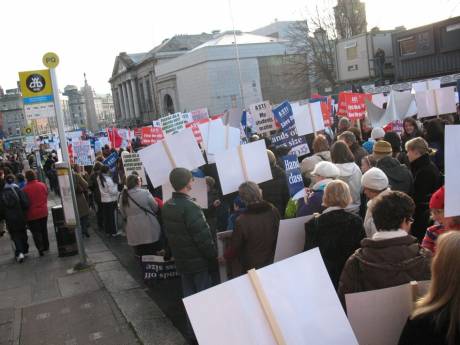
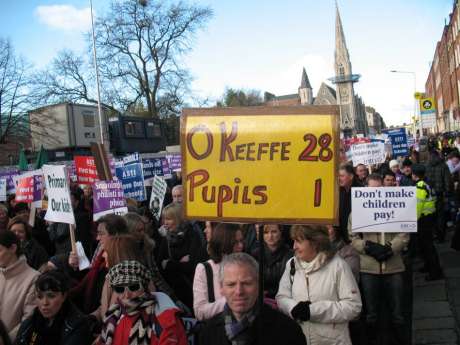
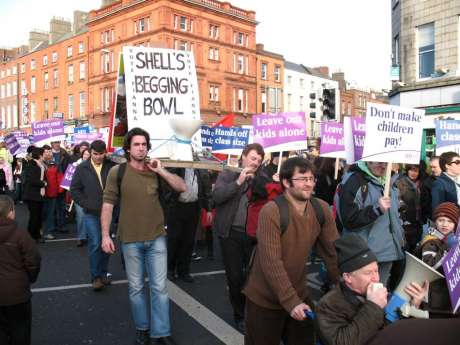
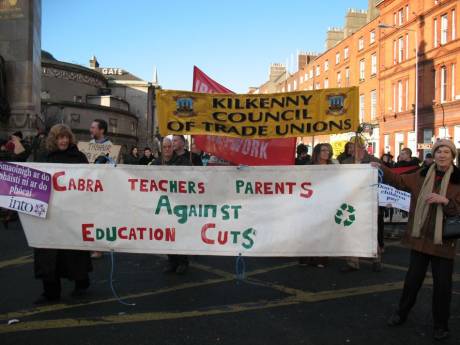
 printable version
printable version

 Digg this
Digg this del.icio.us
del.icio.us Furl
Furl Reddit
Reddit Technorati
Technorati Facebook
Facebook Gab
Gab Twitter
Twitter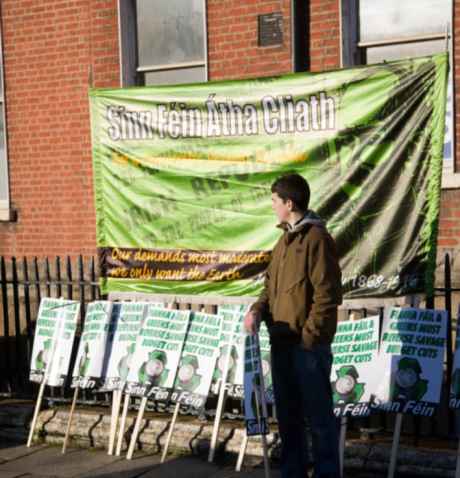


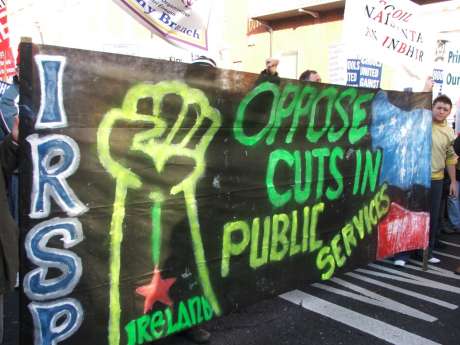
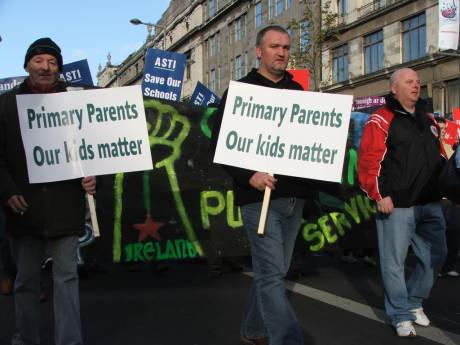
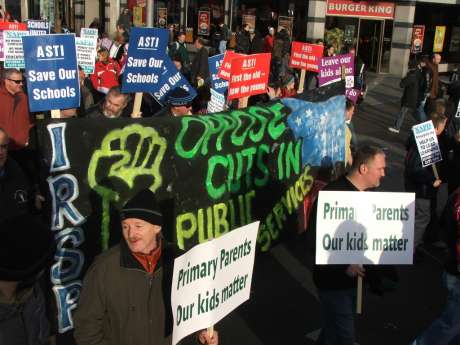
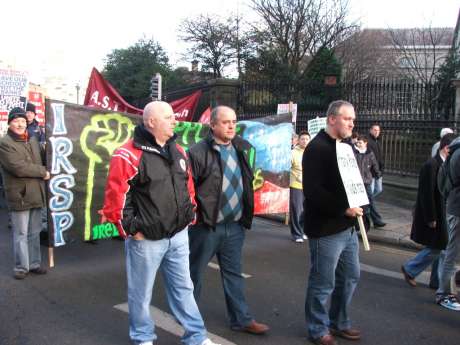


View Comments Titles Only
save preference
Comments (44 of 44)
Jump To Comment: 44 43 42 41 40 39 38 37 36 35 34 33 32 31 30 29 28 27 26 25 24 23 22 21 20 19 18 17 16 15 14 13 12 11 10 9 8 7 6 5 4 3 2 1Quick reflection on previous posts re: understanding class in Ireland.
The transformation of class structure is fundamental to understanding the evolution of any capitalist society. During the 1960's and 1970's the middle class consolidated its position in Ireland, putting its imprint on party politics. Ireland is unusual in that political mobilisation in Ireland took the form of parties attempting to mobilise individual voters by appealing to their class interests rather than classes mobilising through parties as occured elsewhere in Europe. Ireland is historically unusual in that the 'petty bourgeoise' have always made up a large section of the population. This power has been structurally and politically reinforced during the Celtic Tiger.
Also, unlike other European countries, Irelands late 'industrial development' (if you can even call it that) meant the numeric decline, fragmentation and and geograhical dispersion of the working class, and simultaneously the growth and consolidation of the middle class. Middle class political mobilisation, and expression of middle class preferences and interests have proved to be the most dominant force in Irish society. This is no where more obvious than in Irelands 'pay-related' welfare state. That is, the degree to which the middle class (in education, healthcare, pensions etc) supplement basic social rights with private consumption. This, is supported by the state via tax breaks, subsidies etc. Reinforcing rather than mitigating market inequalities. A welfare state for the middle class.
Private purchasers of education and healthcare continue to enjoy the same level of state subsidy as the users of public services but enjoy a more expensive and often better product. i.e. if I go to Clongowes over my local community school I reckon my life chances will be vastly improved. The middle class in Ireland have vastly better life chances and ignoring this deepens working class inequality. So every time the WSM talk about 'we are all working class' they simply marginalise and deepen the structural inequality that the working class experience in day to day life.
This pay related welfare state undoubtedly favours the middle class in Ireland, which is why it is politically naive and unproductive to present both the working and the middle class as one big happy family. It is not. Any class analysis worth its salt will acknowledge this. Ignoring it simply reinforces class inequality.
One thing that comes out of this thread and the current economic crisis: Anarchism is a dead and useless ideology.
This thread puts me in my of the Life of Brian. Fact is that there will have to be paycuts. We are all living beyong our means. Don't mind what Bakunin, Marx or anyone has to say. What are your own opinions. What does your heart and mind tell you?
What is it with names chosen and mis-information?
Anyway 'Worker' has what is either a pretty ignorant or delibretly misleading slur in the line towards the end of his post that reads In fact, the First International split on this issue. The anarchists (spear headed by Proudhon) were against women entering the skilled workforce.
This is untrue on a number of levels
1. Proudhon died 19 January 1865. The first congress of the 1st international was over a year later in 1866. The congress it split was seven years later in 1872. On a purely factual level it was not possible for Proudhon to lead a split that happened 7 years after he had died!
2. The issues of the split had nothing to do with either unskilled workers or women (the minutes etc are online at the Marxist internet archive). Both sides disagree on what the issues were (but neither list either the above) but they rainged from procedural (the manipulation of the delegate recognition process before the congress) to policy (whether or not to endorse electoralism as a strategy for the workers movement).
3. Proudhon may have had the views ascribed to him but although he was a proto-anarchist his remaining followers in the 1860's and 1870's were distinct from the anarchist movement, they were the mutualists and formed another distinct faction in the international. The anarchist movement actually had the most advanced position of the left at that time on what we would call today women's liberation. In fact the first collective document of the emerging anarchist movement 'Revolutionary Catechism' of 1866 even reads well in today's term's in this regard - see http://dwardmac.pitzer.edu/anarchist_archives/bakunin/c....html There really is no excuse for the laziness in confusing the Proudhonist mutualists with the anarchists on this question in particular.
4. Leaving aside the question of women this claim is comically wrong on unskilled workers as well. In fact if anything the anarchists (as opposed to the Mutualists) were inclined to take the opposite position, they had a tendency to lionize the unskilled workers (and peasants) and see skilled workers as having been at least in part bought off.
If your interested in the actual positions of the anarchist movement of that period many key documents are at http://www.struggle.ws/anarchists/bakunin.html (although Bakunin is the author some of these are in reality collective documents, others are from the anarchist press).
On a general note marxist 'scholarship' of the anarchist movement in this period is comically poor. Proudhon is constantly confused with Bakunin, documents from the pre-anarchist period are confused with the documents from the anarchist period of particular writers, authorship is mis-attributed, quotes are invented and mis-attributedm individuals are psychologised etc etc. There could be an interesting marxist critique of early anarchism (1866-74) but its not been written yet and would have to break with the practise of quickly recycling previous inaccurate critiques and normally adding to their inaccuracy!
An anarchist critique of Marx written in this sort of basis would confuse Marx with Hegel and be deservidly ridiculed. I'm rather surprized to hear David Harvey has made such elementary errors but perhaps 'Worker' misrepresents his views?
I see this thread has grown a bit.
Mark - thanks for bringing a bit of reality to the figures and for illustrating again how being selective with the facts is used to bambozzle people. It's an old employer / government trick when spinning a story to quote an hourly rate for jobs where the number of hours is low and to quote a total pay for jobs where routine overtime is high in order to make it look like the workers concerned are in a much better position then the actually are.
Educationalist - I see you have now become Trade Unionist, both names I presume you've chosen to try and give you some credibility that you don't deserve. You were a poor educationalist and your a worse trade unionist. In Ireland trade unionists have understood that the question is not just 'how much tax should be paid' but 'who should pay what proportion of tax'. There were huge mobilisations on that very question nearly 3 decades back. Your economic 'facts' like your earlier ones are selective and premised on an acceptance of the logic of the neo-liberal phase of capitalism. Perhaps like Rip Van Winkle you've awoken from a long sleep, I'll presume this is the case because I'm afraid for your argument that 'logic' no longer has the popular belief of a few months ago. In fact its discredited and collapsed, asserting it as fact as this point in time is comical rather than convincing.
Simon - It's generally a bad idea to take the opinions of someone that is being argued against as defining the opinion of the person doing the arguing. That trade unionist / educationalist insists on seeing thing within a certain logic is to do with their ideology, their unanswerable questions are only unanswerable in their head (and indeed require a set of neo liberal assumptions) I also find your 'reformism' jibe unconvincing as you introduced the idea of over paid teachers sunning themselves in Dubai, an argument that only makes sense to raise in the context of a (right -wing) reformist agenda. It also doesn't actually tie into the soundtrack of the WSM video I posted above.
That said I think the struggle for reforms has always been part of the activity of the anarchist movement, the importance being how something is fought for rather than exactly what is demanded. The 8-hour day movement being one example from the early years of the movement. I don't intend to launch into a more detailed defence of the WSM approach to this question here, if you want that discussion I'd suggest using the Ireland forum on anarchistblackcat (link below). We do at least have a collective approach which is a better starting point than nothing.
The rest of your post uses rather a lot of technical language that I'm not 100% confident of the meaning of but which seems to me to be conceeding my point that wages alone are not a useful indication of class, particularly when you use comparisons between different regions of the planet. The question you ask at the end of that section doesn't seem to have any relationship to what I've been arguing though, in particular the way you choose to lump the 'middle class' (and I'm not sure who you mean by this term) with the 'upper class'.
Anyway in terms of other spaces to discuss all this in more detail I recommend http://www.anarchistblackcat.org/ with anything specific to Ireland going in the Ireland forum at http://www.anarchistblackcat.org/viewforum.php?f=40 Be glad to continue that there.
"The only way increased social spending coupled with strong workers rights will occur is through a social democratic/ socialist led government."
By this logic - So, listening to "Trade Unionist" on how to win the current struggle in education, healthcare and other public benefits in kind is like taking driving lessons but being told you'll never be in the driving seat yourself, and if you don't like the current driver you've a chance to pick a new one in four years time. (What an awkward and awful analogy of driving to politics is in the first place)
Thank god change, reform and improvement in conditions doesn't come about from the self activity of a militant working class placing pressure on governments, to start with ...
I aslo like the argument that the problem isn't partnership itself, but the type of parnership. Jesus wept.
All of this in the face of new cuts both for those within partnership and those without.
P.S. Being against the state doensn't mean you're against "education, healthcare and other public benefits", I would have thought that logic was obvious.
Class structure/ hierarchy is constantly changing. Maintaining the logic that we are all working class because we sell our labour is no longer applicable to contemporary western capitalism. Class has diversified and workers are rational actors that want to protect their skill-specific group.
Presenting the case that we are all working class by virtue of the fact that we sell our labour is an outdated understanding of class dynamics/relationships. It was relevant in early industrial capitalism (i.e. the time Marx wrote Das Kapital) but has become both empirically and ideologically problematic (particularly with the diversification of 'varieities of capitalism and skill regimes' over the past 15 years). With specific skills comes greater status. Higher status gives more social power. Social capital is a concept that is directly related to this status-power.
Workers are rational actors, like employers, and this rational action is always overlooked by old-school class organisations (WSM, SWP, SP etc). Workers who have invested in asset-specific skills (IT, Finance, Law etc) have a vested interest in retaining the value of these assets/skills in the labour market.
This is particularly the case in Ireland. Employment has grown substantially in managerial/professional sectors over the past 10 years (see ESRI) . These workers have an interest in keeping their wage levels at a 'skilled premium' . That is, exempt from the mass unskilled labour. In Germany, workers tend to be closer alligned due to progressive vocational training structures for school leavers who are not academically inclined. This emphasis on industry/ company specific skills is reflected in their welfare programmes.
The greater the significance of a specific skill system in the overall national employment structure (i.e. the more middle class with premium key skills), the more likely the median voter will favour exisiting institutions. Presenting the diversity of social class as one big happy family serves to protect one group: the median voter, i.e. the middle class. And not surprisingly, a lot of us fit into this category, and hence it suits us to classify ourselves as one big happy working class family. But, it is antiquated and empirically dubious argument.
Writers like Michael Albert go some way to tackle this problem by identifying the 'skilled worker' as the 'coordiantor class'. I think someone else mentioned it above. However, I dont think his analysis goes far enough in highlighting the extent of the division between the skilled and unskilled worker , or working and coordinating class.
This class division has always been around but has become significantly more pronounced.
In fact, the First International split on this issue. The anarchists (spear headed by Proudhon) were against women entering the skilled workforce. They opposed it because any job that could be carried out by women was considered unskilled. The anarchists (Proudhon in particular) were predominatly organised amongst the skilled artisans (small craft workshops) and feared that they would lose their higher wages if women entered the artisan trade. Thus, the anarchists opposed women entering skilled labour becuause male workers in these trades would lose their higher wages. This fact is rarely revealed, but is always brought up by the Marxist scholar David Harvey.
Anyway, this is an interesting discussion and thats my tuppence worth.
First Andrew - I don't define class in terms of wage alone. While I consider class in terms of education, wealth and lifestyle it remains rooted in material condition - the base determines the superstructure not the other way around (sorry weber). I think class can be measured by degrees of social power ie the level of control one has over ones own life condition - or indeed over the lives of others. Naturally social power is relative to the specific society so although a supermarket floor worker in Ireland may get paid more than a manager in Somalia, the manager occupies a higher social station relative to his own society.
Status is key - Capitalism requires that people define themselves according to their degree of power in order to preserve the economic base. Commodities take on a new dimension apart from function or ‘’use value‘’, they become material manifestations of the social hierarchy. Acquisition of (specific) goods and services become the main drive in that people (define) themselves in relation to there position - ever aspiring towards power by accumulation of (social capital). Commodity fetishism ect are protected by the countervailing idealogical hegemony.
Andrew the ruling elite have a reasonable understanding of class dynamics. Social mobility and wage protections are tools used to reduce class antagonisms. Preservation of the middle class by way of controlled concessions ensure the unification of labor/socialism remains beyond reach. Social democratic policy ensures the survival of capitalism and is ''in reality'' the most right wing approach going.
Again I ask you - why would the upper or middle class participate in the dismantlement of the hierarchy that they define themselves with ?
Sorry for putting this in the wrong place - is there somewhere we can continue on here ? BTW - Im an anarchist Im just skeptical of the WSM - they seem reformist or something, spending disproportionate amounts of time on single issue camps - symptoms rather than the cause.
I think the comments above are a good example of what Im referring to - you seem to have convinced people that your little more than social democrats in a bid to obtain a quick fix of credibility. Naturally you cant answer the inevitable questions when posed in a capitalist framework - because thats the framework youv chosen to function within.
I think you will note Andrew that the educational facts provided are not meant as an argument. They are not selective. They are simple difficult truths.They speak for themselves. We spend less on education than most countries, and within that expenditure we spend more on wages than most countries. The key challenge is to increase social spending to keep good wages/labour but simultaneously increase spend per student.
We, in the Trade Union movement are only too aware of the good wage conditions that teachers receive. This is not a bad thing, but a fact. There is no point pretending otherwise. To maintain good working conditions and reverse the cuts requires increased social spending. That is what the facts tell you. Economic- factual reasoning has never been the strenght of anarchism though, has it.
The government will only allocate a certain amount of resources to education. Scandanavian countries allocate max 6.5 per cent of total GNP. Even left led south american governments rarely go above this resource allocation. When cuts in expenditure happen they will occur in chopping front line services not wages - fact. The government would not dare cut wages even though they know this is where most expenditure occurs. Whether you like it or not the bulk of money available to spend on education goes on labour.
Ireland has high wages and this is not a bad thing. It is the result of social partnership. A neccessary evil in fighting for working reforms. Increased wages (with an element of wage restraint) and decreased taxes have been central to all wage agreements. Ireland is unique in that the broader aims of social justice and increased social spending that usually come with centralised agreements have been absent in social partnership. This is the problem.
Whether you like it or not; Irish workers have opted for increased disposable income through cuts in direct taxation. Any attempt to keep high wages, and not cut back in social programmes requires more money. More investment. This will only come about through increased taxation. These increases in taxation, and more robust counter cyclical social spending by the state is only likely to occur under a left wing government. Now, have you ever tried to convince workers of the need for increased taxation Andrew? I doubt you have, but let me tell you - it is bloody difficult. The only way increased social spending coupled with strong workers rights will occur is through a social democratic/ socialist led government.
But, of course, you guys dont believe in the state. So, listening to anarchists on how to win the current struggle in education, healthcare and other public benefits in kind is like taking driving lessons from a blind driving instructor. Stick to the propoganda.
I've been meaning to post on this debate, which I have been following closely, and will in a more substantive manner when time permits. But firstly, may I comment on teachers' pay (and preface this by saying I am a teacher myself).
Teachers are paid a yearly salary, not an hourly rate. Our yearly salary is based on industrial averages and increments. For example, I am paid somewhere in the region of 35,000 a year, but since my contract is for 18 hours a week class contact time (out of a maximum 22) I am paid nine elevenths of 35,000 - somewhere in the region of about 30,000 - less than the industrial average.
The rate of €50 per hour for teachers is, I presume, referring to (qualified) substitute teachers. Whilst this looks like a good wage in hourly terms (actually it is a good wage in hourly terms) one must remember that a teacher can only have 22 hours a week maximum class contact time (the other 18 hours to make it a 40 hour week coming from class preparation, corrections, etc.) which in effect cuts the €50 per hour in half almost. Add to that then that substitute teachers do not get paid for holidays (or, I think, bank holidays, etc) the rate is lower, as the money earned has to last for 12 months even though only 9 months work is completed (7 months when you discount holidays) and then of course the substitute teacher has to pay tax. (I'm certainly glad I'm not a substitute teacher anymore).
_______________
We, also, don't get "Summer's in Dubai" - it's just not in the job spec.
_______________
Your not a great 'educationalist' when you carefully select what facts you will and will not give in order to make your argument. That's more the realm of the propagandist.
Yep teachers in Ireland are paid higher than the EU average but then our minimum wage is also above not just the EU but the OECD average
An analysis of minimum wages in this year's (1997) taxation report from the OECD says the Irish minimum wage was the equivalent of $9.51 per hour last year, compared with an average for OECD countries of $5.68.
Only France, the Netherlands, Britain and Luxembourg had higher minimum wages. But Irish workers on the minimum wage take home more money than any of them.
Strange as it may seem workers in Ireland do well in terms of wages (but badly in terms of cost of living).
Right now the bosses are seeking to drive down everyone's wages with building workers being in the most direct firing line. It is sheer idiocy for anyone who has the interests of the working class as heart to suggest any sector of workers is over paid. That is the bosses game, pick off one section and then move on to the next. Either we stand together or we hand seperately.
Some interesting facts on education that should frame the debate/ context of this campaign.
1. 23 per cent of the current population are currently enrolled in full time education.
2. In 2004 expenditure on education was 5.4 per cent of GNI (Gross National Income), down from 6.4 per cent in 1995.
3. Education expenditure accounted for 14 per cent of total government spending in 2004, up from 12.5 per cent in 1995.
4. The student - teacher ratio for primary and secondary schools is below the EU and OECD avergae.
5. In 2005 the student – teacher ratio in primary schools was 17.9 compared to the EU average of 14.9
6. For secondary schools the teacher - student ratio was 15.5 compared to the EU average of 12.2.
7. 84 per cent of expenditure on education at primary and secondary level goes on teachers wages/salaries, substantially above the EU average.
8. Capital expenditure accounts for 7 -8 per cent.
9. The teacher - student ratio at third level is at the OECD average but below the EU average.
10. 77 per cent of expenditure on third level education goes on teachers salaries/wages. The EU average is 64 per cent.
11. Overall participation rates in higher education have increased. It is highest among higher socio-economic groups.
12. Students from professional backgrounds have increased from 59 per cent to 97 per cent.
13. Participation rates amongst the bottom three categories of socio-economic status account for less than 20 per cent of participation in third level. These are primarily located in the non university sector.
Thus, Ireland invests less than the OECD and EU average in primary, secondary and teritary education, but pays teachers/ lecturers etc far above the OECD and EU average. This is not a value judgement but an inescapable fact. And contrary to the far-radical left - I tend to view facts as important.
Simon the logic of your position (and it is common enough on the left) is that as soon as a group of workers actually start to improve their wages they move outside the working class. Similar attitudes are displayed towards education. The race to the bottom leaves you with a working class that is composed of a minority of a minority, after all in comparison to an Asylum seeker on 19.20 a week 8 euro a hour is a lot and even the asylum seeker is doing well in comparison with an unpaid slave worker in a Chinese mine or an Indian recycling process.
Also the wages teachers earn in Ireland are comparable with those British miners earned or Detroit auto workers earned but few on the left would try and exclude them from the working class. As I suggest above the problem is that few on the left have ever met a genuine capitalist so the tendency is to focus on what divides those they know from each other (whether that is wage, accent or favourite sport) rather than that which divides most of us from the relatively unknown them.
Which is not to say that these differences including the way different sections of the working class view themselves in relation to other sectors is unimportant. Its one of the things that keeps us divided, tuppence looking down on a penny (and vice versa).
I don’t know - many teachers are on pretty good wages i.e. 50 euro per hour, not to mention all the benefits - summers in Dubai ect. What about working single mothers on 8-9 euro an hour who cant afford a house and need to pay rent?
The disparity is shocking - surely the upper middle class extracts a disproportionate amount of wealth from the system in relation to its size. Let’s not forget that they are also responsible for ''managing'' the labor capacities of the socially subordinated lower working class's.
Education is a right but that protest had strong undercurrents of champagne socialism ''Labour''. Has it ever occurred to any of the social anarchists that the upper middle class (and many more) - define themselves in relation to there status position and will therefore act as an obstacle to the democratization of society ?
Why would those who disproportionately benefit from power sacrifice it for equality?
Quick confirmation that the reference to 'the common people' was a third party sub edit rather than part of the original piece. As the (offending? active? on duty?) editor I can also confirm that it was a rather hamfisted reference to the Pulp song, inspired in part by the IRSP reference to the 'mass of ordinary people'.
But i think there was a bit more as well - I attended the march and was struck by both the composition and the mood of the demonstration. If anything it felt pretty middle class - with a lot of teenagers and groups of muinteoiri obviously on a day out. I think both WSM and the IRSP would have an un-common commitment to working for social change - but they were joined by a huge number of others who generally concerned themselves with more common activities than marching, leafletting and internet proselytising. And these numbers were not in a festive or even a particularly fired up mood. This was not the euphoria of the big anti-war marches - nor was it the anger of the pensioners march.
Looking around, this was middle ireland, And it felt like it was setting in for the long haul.
Apologies for any confusion caused, thanks Andrew for the original report and the bit of politics, and sorry to disappoint the sad internet sectarians who wanted to draw lessons about anarchists but nope, wrong yet again.
More photos from the march.
Start of March
Backing up O'Connell Street
éirígí posters
éirígí banner
At least 50,000 people participated in a massive march in Dublin on Saturday to protest against education cutbacks announced in October’s budget. After years of insufficient investment to repair the cutbacks of the 1980’s, the government is now using the economic downturn to attack education and other essential public services writes Darren Cogavin reporting from the demonstration.
http://www.fifthinternational.org/index.php?id=193,1468...0,1,0
To Ricardo - So the WSM are now "opposed" to the middle class? I think you are confusing terms here. Sociological terms for particular socio-economic groups are in common usage, for instance : working class/middle class/upper class.
However, when anarchists talk about class, we are (generally) not talking about the socio-economic groupings that sociologists care about. The anarchist term working class includes the vast majority of society - the entire sociological working class and most of the "middle class" also. Parecon uses the term "Co-ordinator class" which I find useful to describe a particular class whose role lies in between the ruling class and the working class.
Finally, anarchists use the term "ruling class" to describe larger capitalists, high level politicians, senior civil servants, CEO's and other individuals in whose interests the economy and society is largely run. "Ruling class" is not quite interchangeable with the socioeconomic term "upper class" - you might be upper class but not a capitalist nor hold any real power you may merely have come from a wealthy background and since renounced your wealth etc.
Anarchists are certainly not "opposed to the middle class", nor are we actually opposed to the co-ordinator class - it is not quite accurate to say that we "identify" with the working class either - it is not so much a matter of "identification"as that we feel that the working class is the class that holds the real power - the ability to initiate a social revolution which will overthrow capitalism and institute socialism. Obviously many individuals within the WSM do identify themselves as part of the working class, but it is not our identifying ourselves as part of the working class PER SE, which defines us, or our politics.
Thanks to ed for the clarification that The subtitle and first paragraph were added by an indymedia editor and were not part of the original story.
I don't see why people are being so precious about this addition though, I mean its not what I'd have written but the whole concentration on it (and to an extent most of this thread) is a classic example of one of the major problems of the left, an obsession with form over substance. I'd suspected the subheading was a tongue in cheek reference to the Pulp song - http://risa.co.uk/sla/song.php?songid=19355 which in itself was a little bit odd given that the march was composed of school teachers. But then I'm hardly the off spring of a Greek millionaire either.
I suspect the real problem here is that few people on the left have ever met someone who is genuinely part of the capitalist class and so tend to associate relatively minor wage differentials with class divisions. Chomsky for instance must make a comfortable living out of his MIT position (though from what I know of whom he may well be using a good chunk of his income to fund stuff) but he's hardly a member of the ruling / upper class. Not that I'd care that much, at his age he hardly has to prove his commitment.
To stop your IP being automatically logged by the provider of the (Google video) video content, we have not loaded it automatically. If you wish to proceed to watch the video, then please Click here to load the embedded video player for video Id 4635474588187443630

This setting can be controlled by your User Preference settings.
The common people reference is pretty off putting and does lead to negative connotations with regards anarchists and ignores the number of anarchists both in the WSM and unaligned that are either teachers, members of INTO, parents and students in that they are directly affected by this as well as those suffering from the same cutbacks on third level education and organising to fight back. All of this even before the wider relations of class.
Ricardo
Yea I agree its a working class movement first and formost - sorry if came off the wrong way. However anarchism identifies with everyone who opposes the current system - regardless of background. I was making the point that activity is not closed to members of any specific group. Like I said Marx was middle class, getting into social exclusion wouldnt get us very far. Anyone who wants to abolish class is welcome to help. I mean should Chomsky be banned from attending anarchist rallies - surely he qualifies as upper class ?
Class is a complex subject - I mean what model are you going on ? How do you define class ect - there are various perspectives on the topic and its (far) from black and white. I mean the Marxian depiction of class is no good for describing contemporary society - if you define class only in relation to the means of production youl find yourself calling the rulling elite the proletariat !
The WSM Definately does identify with the working class in opposition to middle/upper/ruling classes.
Student - do yourself a favor and read up on Anarchist history before spouting b/s - Im sure your collage has a library.
Anarchism is a working class movement first and foremost. Look at the video above please, I put it up for a reason - If you think the people of those Argentinean factory collectives are middle class I suggest you get your head examined. Whenever Anarchism has been put into practice it has been done so predominantly by the working class/proletariat. Its certainly true that within (modern Ireland) socialism has a substantial following among members of the middle class - so what ? Karl Marx was middle class, I fail to see your point. Anarchists aim to abolish class altogether so do not identify ourselves with any paticular socio economic group - we are all (human beings) equal in rights and share the common goal of building a society based upon this premis. The notion that we should all gravitate towards a paticular lifestyle based on (status aquisition) then proceed to judge human worth according to class is disgusting. (A)
The subtitle and first paragraph were added by an indymedia editor and were not part of the original story.
"Anarchists and republicans report on their day with the common people"
This title says a lot about anarchism (and my experience of anarchists, who have some sort of weird romantic longing to be like the 'common people'). Is there some sort of division between anarchists and the common people?
Or is it an admission that most anarchists are not common people but middle/upper class students and ex middle/ upper class students, and this protest was an opportunity for you to mix with common people?
Having said that, it seems like anarchists are more active (or just better at distributing their leaflets/posters) than anyone else in my college. So, fair play.
Please find attached...